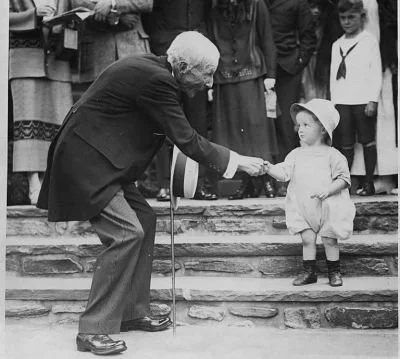The Power of Giving: How to Create Wealth
John D. Rockefeller gifting a 5-cent coin to a child, 1929
John D. Rockefeller, born in 1839 into a poor family in upstate New York, began working at age 16 as a clerk in Cleveland to support his family. His first wages were just a few dollars a week, yet from that very first paycheck, he set aside 10% for charity, following the Biblical practice of tithing.
Rockefeller later reflected:
“I tithed from my first dollar, and I never would have been able to tithe the first million dollars I made if I had not tithed my first salary of $1.50 per week.”
As he progressed from clerk to bookkeeper and then to oil refiner, his income grew exponentially — and so did his giving. By age 24, he was already donating thousands of dollars annually.
In his early 50s, at the height of his career, Rockefeller faced a life-threatening illness. Rather than retreating, he doubled down on philanthropy, establishing what would become the Rockefeller Foundation. Not only did he survive, but he lived to the age of 97, attributing both his wealth and health to his commitment to charity.
By the time of his death in 1937, Rockefeller had given away over $530 million (over $10 billion in today’s value) to charity. He famously said:
“G-d gave me my money. I believe the power to make money is a gift from G-d, to be developed and used… to build the Kingdom of G-d on Earth.”
Sir Moses Montefiore: Wealth as a Trust
Sir Moses Montefiore (1784–1885), an English Jewish financier and philanthropist, lived by a similar principle: wealth is a trust from G-d to be used for the betterment of others.
From early on, Montefiore committed to giving a tenth of his income to tzedakah, expanding this as his fortune grew. While other financiers rose and fell with market fluctuations, Montefiore prospered steadily, attributing his success to the merit of giving generously.
Once, he was asked, “Sir Moses, how much are you worth?”
After a pause, he named a figure. The questioner replied: “That can’t be right. By my calculation, you must be worth ten times that amount.”
Montefiore responded:
“You didn’t ask how much I own. You asked how much I am worth. I calculated the amount I have given to charity this year, and that is the figure I gave you. We are worth what we are willing to share with others.”
Montefiore’s philanthropy was global: he funded schools, hospitals, agricultural projects, and housing in Israel, and traveled widely to protect Jewish communities from oppression.
The Rebbe and the Business of Blessing
A businessman once approached the Rebbe for a blessing after facing financial difficulties. The Rebbe asked how much maaser ( 10% for charity) he had given. The man admitted he had stopped giving due to slow business.
The Rebbe explained:
“It works the other way. When you give charity, it opens the channel for G-d’s blessing.”
The businessman recommitted to giving maaser faithfully, and shortly afterward, a major deal transformed his fortunes.
Tzedakah: Righteousness Through Giving
These examples highlight a central Jewish teaching: tzedakah is more than charity. It is an act of righteousness and moral obligation — the word tzedek means “justice” or “doing what is right.”
The Torah instructs in this week’s portion, Re’eh:
“If there will be among you a needy person… you shall not harden your heart, and you shall not close your hand from your needy brother. Rather, you shall open your hand to him, and you shall lend him sufficient for his needs” (Deuteronomy 15:7-8).
Giving tzedakah may seem counterintuitive — why part with hard-earned money?
Judaism reframes wealth as a gift from G-d, entrusted to us to share for the benefit of others. By giving, we elevate material resources and infuse our physical lives with spiritual purpose.
The Torah commands giving at least 10% of one’s income, as stated “a tithe shall you tithe” (Deuteronomy 14:22).
The Talmud interprets the repetition of the command homiletically: "Take a tithe [asser 10%] so that you will become wealthy [titasher], in the merit of the mitzvah." The Hebrew word for tithing shares the same root word as wealth. The Torah conveys to us that by fulfilling the Mitzvah of giving ten percent of our income to Tzedaka, we are rewarded with wealth.
Tzedakah transforms wealth into a spiritual tool. Money represents the tangible results of time, effort, and intellect, yet it can also be the vehicle for spiritual and social impact. The sages teach that tzedakah is equal to all other mitzvot combined because it elevates every aspect of our lives invested in earning it (Tanya, Rabbi Schneur Zalman of Liadi).
The Broader Impact
Giving tzedakah benefits both giver and recipient. From Abraham and Sarah to modern philanthropists, Jews have led by example in charitable giving, inspiring society at large. Modern initiatives like The Giving Pledge, Giving Tuesday, Daily Giving, and corporate matching programs echo this timeless principle: generosity multiplies blessings and transforms the world.
The Talmud further teaches:
“Giving tzedakah brings redemption near.”
Through acts of tzedakah, we help create a world that reflects the Messianic vision — a physical world transformed into a beautiful home for G-d, realized one generous act at a time.


